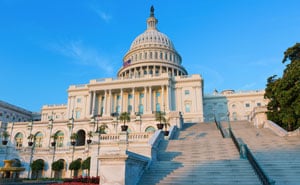 A government shutdown is looming in the background if lawmakers on Capitol Hill can't emerge from the August recess willing to keep the government funded before an Oct. 1 deadline.
A government shutdown is looming in the background if lawmakers on Capitol Hill can't emerge from the August recess willing to keep the government funded before an Oct. 1 deadline.
Without a plan to keep funding coming, a government shutdown would temporarily reduce the federal workforce and agencies to skeletal staffs while forcing "nonessential workers" to take furlough days. It would close down national parks. It would also limit government services.
The last government shutdown occurred in October 2013 when Republicans in the House of Representatives passed a budget bill that scaled back provisions in the Affordable Care Act - budget cutting measures that Democrats were loath to endorse.
The government shutdown furloughed 800,000 federal workers. And it took 16 days to come to a compromise.
If a government shutdown were to occur, it would be the second time in two years. Despite several contentious budget seasons before the 2013 shutdown, there hadn't been one since 1995.
There will only be 10 days for Congress to compromise on a budget prior to the Oct. 1 deadline, and since videos suggesting Planned Parenthood harvests the organs of aborted fetuses have surfaced, there is likely to be an emotional political battle over defunding the organization.
The Planned Parenthood debate is over $500 million. That's peanuts compared to the $4 trillion budget President Barack Obama introduced earlier this year. But it has much broader implications for the health of the U.S. political process if it does produce a stalemate.
So, how would a government shutdown affect the stock market?
Let's give that a look...
How Would a Government Shutdown Affect the Stock Market
Looking back on years past when government budget battles and political brinkmanship either threatened shutdown or actually caused one, we get a good picture of what a shutdown this October could mean for the stock market.
And it looks like it would have very little impact.
The last government shutdown took place over a few months. There was a brief shutdown between Nov. 14, 1995, and Nov. 19, 1995. The Dow Jones Industrial Average was actually up 2.3% through that ordeal.
A second round shutdown occurred between Dec. 16, 1995, and Jan. 6, 1996. Once again, with little impact on the stock market as the Dow stayed relatively flat and then continued to march up thereafter.
Through the 2013 government shutdown that lasted from Oct. 1 to Oct. 16, the Dow closed up about 1.2%.
In short, the stock market isn't too sensitive to Congressional inaction - at least as it pertains to petty budget battles.
Where it becomes a problem is when an already highly divisive Congress willing to upend the whole $4 trillion budget process over a $500 million allocation is faced with a much more dire consequence, such as the debt limit.
Granted, the U.S. debt has actually been growing much slower than it did in 2011, when Congress threatened to default and the U.S. credit rating was downgraded.
But the precedent has been set. And with the recent Puerto Rico default and the Greek debt crisis only adding more fuel to the deficit hawk cause, you can expect that such political theater won't end.
The budget battles of 2011 showed that Congress has become so debt-obsessed that some members are willing to risk a default and the consequences that come with it.
[epom key="ddec3ef33420ef7c9964a4695c349764" redirect="" sourceid="" imported="false"]
Some economists, notably James Grant, like to say there is a precedent for U.S. default, or like to point to Greece, Puerto Rico, and Argentina and say we're next. But there are very few parallels.
Past defaults on U.S. debt either came during postwar eras when the U.S. Treasury debt system didn't operate as it does today, or on procedural errors caused by technological malfunctions as happened in the 1970s. Those instances are irrelevant.
And situations like Greece fall short of providing a case study for the United States. Greece, Puerto Rico, Argentina, and pretty much every sovereign debt default in history came after either a foreign currency peg was abandoned, or because that particular sovereign doesn't issue its own currency.
The U.S. issues debt in dollars. It can't run out of dollars because it can always print them.
Obviously there is a concern long term as to whether the unfunded liabilities are so much that the United States won't have the productive capacity to ensure those new dollars can be spent on something, thus sparking inflation, and those discussions need to happen.
But allowing political divisions to grow so wide that Congress has become more receptive to an unprecedented U.S. default is dangerous. And that's why a government shutdown could be bad for markets.
It could work to widen political differences, which could in turn embolden lawmakers to voluntarily throw the U.S. government in default on false pretenses.
Jim Bach is an Associate Editor at Money Morning. You can follow him on Twitter @JimBach22.
So is the United States the next Greece or Puerto Rico? Not likely...


